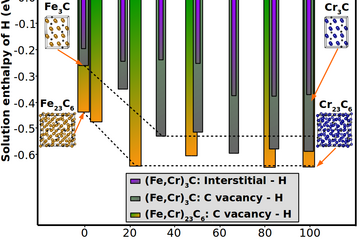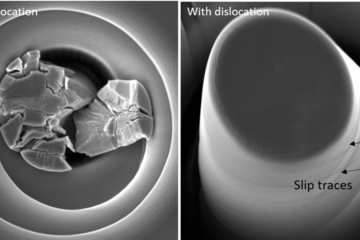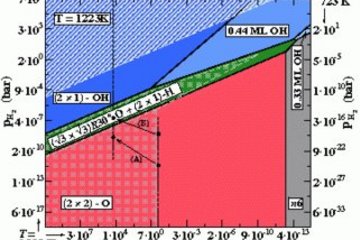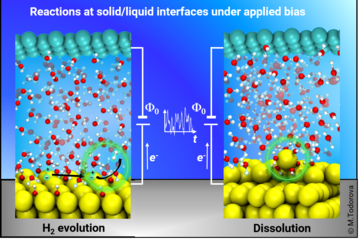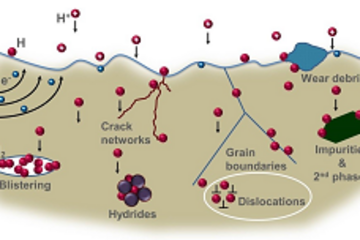All genres
1381.
Poster
CALPHAD assessments using T > 0K ab initio data: From quasiharmonic to local anharmonic approximation. CALPHAD 2015, Loano, Italy (2015)
1382.
Poster
Formation Energy of Zn-ions in water: An ab initio molecular dynamics study. ICMR Workshop - Advances in oxide materials: Preparation, properties, performance, University of California, Santa Barbara, CA, USA (2014)
1383.
Poster
Ab initio description of dynamically unstable systems from zero Kelvin up to the melting point. CALPHAD 2014, Changsha, China (2014)
1384.
Poster
Ab-initio based prediction of magnetism in Fe–Mn–Al–C kappa-carbide precipitates in steels. ADIS Workshop , Ringberg, Germany (2014)
1385.
Poster
Ab-initio based study of kappa-carbides in Fe-based alloys. Asia Sweden meeting on understanding functional materials from lattice dynamics (ASMFLD) conference, Indian Institute of technology Guwahati, Guwahati, India (2014)
1386.
Poster
Ab-initio understanding of interaction of kappa-carbide with hydrogen in steels. ICAMS Science Days , Bochum, Germany (2014)
1387.
Poster
Intra-martensitic transitions in Ni–Mn–Ga magnetic shape memory alloys: First-principles study. International Conference on Martensitic Transformations 2014 (ICOMAT 2014), Bilbao, Spain (2014)
1388.
Poster
Intra-martensitic transitions in Ni–Mn–Ga magnetic shape memory alloys: A first-principles study. ADIS 2014, Ringberg, Germany (2014)
1389.
Poster
Lattice dynamics in systems with magnetic disorder: Role of fluctuations investigated with the itinerant coherent potential approximation. ADIS 2014, Ringberg, Germany (2014)
1390.
Poster
Ab-initio investigation of layered alloys: a roadmap for improved magneto-caloric effect. EUROMAT 2013, Sevilla, Spain (2013)
1391.
Poster
Design of ductile Mg alloys by combining ab initio and experimental methods. Euromat 2013, Sevilla, Spain (2013)
1392.
Poster
Limits of Indium Incorporation on In1-xGaxN {0001} III- and N-Polar Surfaces: An Ab Initio Approach. 10th International Conference on Nitride Semiconductors, Washigton DC, USA (2013)
1393.
Poster
Atomistic and inverse-analytical modeling of elastic properties of coherent nano-phases. GDRi CNRS MECANO General Meeting on the Mechanics of Nano-Objects, MPIE, Düsseldorf, Germany (2013)
1394.
Poster
Ab-initio based prediction of chemical trends for phase transitions in magnetic shape memory alloys. Computation meets Experiment: KKR Green functions for calculations of spectroscopic, transport and magnetic properties, Department of Physics, University of Warwick, Warwick, Coventry, UK (2013)
1395.
Poster
Electrochemical Pourbaix phase diagrams from ab initio calculations. XLII CALPHAD Conference, San Sebastian, Spain (2013)
1396.
Poster
Interactions of oxidizing species with the Mg(0001) surface: The role of electrostatic contributions. Connecting electrochemical and water simulations: Status and future challenges, Ringberg, Germany (2013)
1397.
Poster
Extending the concept of semiconductor defect chemistry to electrochemistry. Connecting electrochemical and water simulations: Status and future challenges, Ringberg, Germany (2013)
1398.
Poster
Stacking Faults in fcc Iron: The Influence of Magnetism. DPG spring meeting 2013, Regensburg, Germany (2013)
1399.
Poster
Extending the concept of semiconductor defect chemistry to electrochemistry. Workshop "Connecting electrochemical and water simulations: Status and future challenges", San Sebastian, Spain (2013)
1400.
Poster
Carbon diffusion path around edge dislocation in bcc iron. 10th Materials Day, Bochum, Germany (2012)




